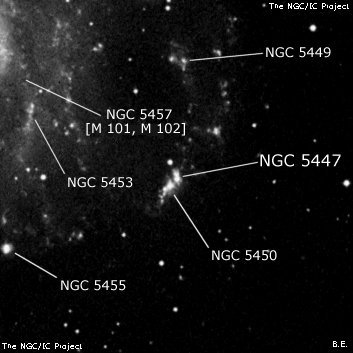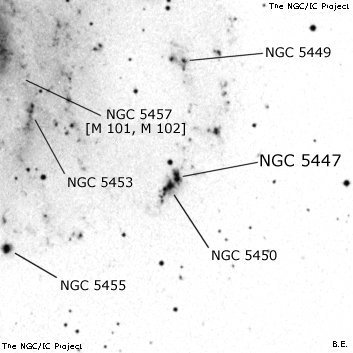NGC/IC Project Restoration Effort
(This is a very very beta version)
NGC5447


Basic Information
Location and Magnitude
Right Ascension: 14:2:29.0
Declination: +54:16:21
Constellation: UMA
Visual Magnitude: 13.5
Historic Information
Discoverer: Herschel W.
Year of discovery: 1789
Discovery aperture: 18.7
Observational
Summary description: pB, S, R, gmbM, conn with M 101
Sub-type: GxyP
Corwin's Notes
=====
NGC 5447, 5449, 5450, 5451, 5453, 5455, 5458, 5461, 5462, and NGC 5471 are HII
regions and/or star clouds in NGC 5457 = M 101. Most were discovered by LdR,
though WH found three of the brightest, and d'Arrest noticed the outlier,
N5471. Unfortunately, only the identifications of WH's and d'A's objects are
unambiguous from the original positions.
The positions of the others turn out to have been determined by JH for GC. He
used the sketch of M 101 that appeared in LdR's 1861 paper to estimate offsets
from stars with known positions. This must have been a hurried chore, since
his resulting positions for the knots are not very good.
Without additional observations, Dreyer simply adopted JH's GC positions.
There has thus been some confusion over the identifications of the objects
found by LdR. Only in two cases, N5461 and N5462 (both found by WH), did LdR
provide offsets from a nearby star. D'A's object, N5471, not only has a good
position, but is isolated enough from the main body of the galaxy that its
identification is also certain.
To identify the other objects, I have gone back to the published 1861 sketch
where they are clearly shown. Identifying the knots which JH saw in the same
sketch is easy. With those identifications in hand, I remeasured the
positions, and have also been able to sort out most of the identifications
used in earlier papers on M 101. The correct identifications and new
positions are in the main Table.
Note that most of the knots are irregularly shaped, and may have more than
just one "nucleus" involved. This is true of NGC 5447, 5449, 5450, 5451,
5453, 5461, 5462, and 5471. Where multiple positions have been found by the
automated surveys, I've attempted to sort them out and combine them into a
single position that represents the objects. Note, too, that there are other
faint objects involved with these that I have not provided positions for. An
example is NGC 5450; there are five relatively bright knots involved in this
object with at least three other fainter ones very close. Some of these may
actually be supergiant stars or clusters rather than HII regions.
Steve's Notes
=====
NGC 5447
18" (6/21/03): at 215x this fairly prominent HII region appeared as an elongated patch oriented NNW-SSE, perhaps 25"x8", located just south of a mag 13.5 star. At 323x this patch clearly resolved into two sections -- within 30" of the star is a very compact knot, ~6"-10" diameter. There may be a small gap to the south with a larger extension to the SSE (this is NGC 5450). Located on the opposite side of M101 as NGC 5462.
17.5" (6/7/97): brightest HII region on the preceding side of M101 located 7.8' SW of center. Appears as a very elongated glow NW-SE situated just south of a mag 13.5 star. A very small knot is partially resolved at the north edge within a common halo with the extension to the SE. Harold Corwin identifies these two components as NGC 5447 and NGC 5450.
13": this is a knot in an outer arm of M101 on the western side. Easily visible, compact, round. Located symmetrically opposite from NGC 5462 on the opposite side of the core.



